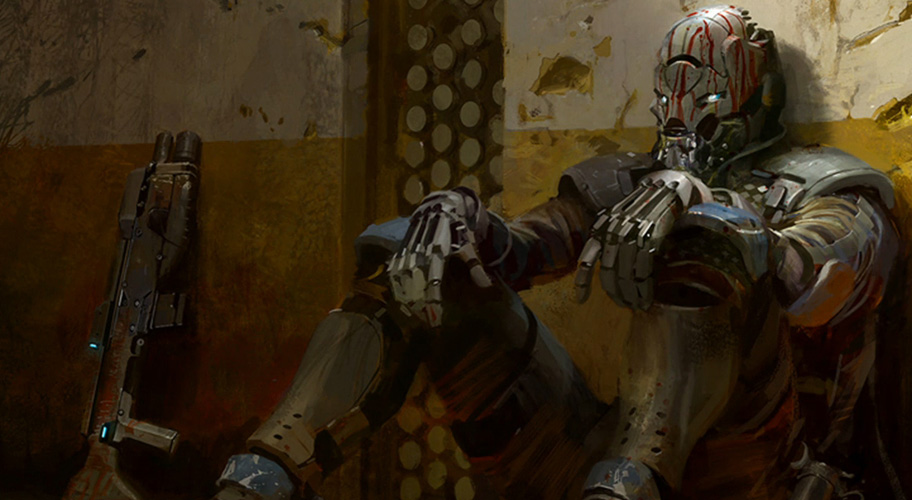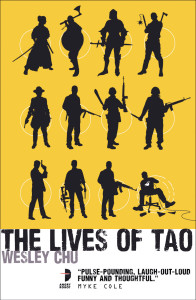Aidan was kind of enough to give me the pulpit and asked me to share my thoughts on why I think aliens make such great enemies/sources of conflict in science fiction. Now, before I delve deeper into this, I believe it is important to break down the roles of aliens within the science fiction genre.
I find that these truly alien “Aliens” tend to make poor primary plot devices since readers need to make some sort of connection with antagonists in order for them to be effective enemies.
Aliens are portrayed usually in one of two ways. First, in the true sense, they are introduced as something completely foreign to Earth and our way of thinking. We tend to have a difficult time grasping their physiology, method of thinking, and purpose behind their logic. I find that these truly alien “Aliens” tend to make poor primary plot devices since readers need to make some sort of connection with antagonists in order for them to be effective enemies. Good storytelling requires the reader to sympathize or understand the characters in a book. Otherwise, the alien just devolves into being an antagonist for antagonists’ sake. Or in the words of Tropic Thunder, it’s like going “full retard.” The exception to that is if these antagonists are there only to serve as a plot device to reflect the focus of the story back onto the protagonist. It’s not about the goal, it’s about the journey sort of storytelling.
The second way that aliens are portrayed in science fiction is to make them not alien at all and uses them as a literary vehicle to explore social issues within our culture and society. Usually, the author does this a safe distance by hiding behind the façade of portraying an alien culture, but can delve deeply into lingering prejudices and social stereotypes.

Art by Ken Barthelmey
That is one of the things science fiction has always excelled at. It’s one of the most effective tools to analyze humanity and challenge social issues. Classics like The Left Hand of Darkness used alien culture to hem to explore several aspects of gender, politics, and religion. Several of Joe Halderman and Robert Heinlein’s books used alien wars as a vehicle to reflect the effects of war, totalitarianism, humanism, and PTSD on a society and its soldiers. There’s dozens of other examples that can be pulled. In movies, District 9 is a study on apartheid, and Avatar reflects the struggles of Native Americans, Contact explores faith.
Let’s run all this down in an example:
James ran away from home at the tender age of sixteen. He joined the Mars Defense Force because he was homeless and hungry. However, he eventually learned to love the corp and believe in his duty to defend his loved ones and keep a free Mars from the corrupt tyranny of the Earth Conglomerate Corporations…. Yada yada yada.
The Earth Conglomerate Corporations on the other hand, simply want to profit from Mars and its rich deposits of Chutanium ore. Unfortunately for them, their stranglehold on the mining industry was broken when Mars colony declared their independence from Earth and now demands that all corporations respect their sovereignty and laws. Now, the corporations had spent trillions of dollars building the infrastructure of Mars, and they feel like they have a right to the planet and its rich mineral deposits. So therefore, they send their private military to invade the planet. Both sides get ready to throw down to the Chutown.
Easy peasy. Still with me so far? Jimmy’s motivations are straightforward and respectable. We as the reader understand what drives him to do what he does. He cares about his family, his home, and his duty. He believes he is doing the right thing and is willing to die for his cause.
The Earth corporations on the other hand, believe they’re in the right. It was their massive investment in colonizing Mars that made living on the planet possible. They had assumed a tremendous risk and had worked countless hours to see their mining base a reality. They believe based on the contracts they made with the various Earth governments that they own the colony as well as all the minerals being mined there.
Stories like […] James Cameron’s Aliens effectively leverage such uses of unknown aliens [by focussing] on the development and relationships of the protagonist.
See, regardless of who you side with, you understand everyone’s motor. They’re very human thoughts that evoke human emotions. Basically, we get both sides. We might agree with one side more than the other, but the purpose, motivation, and drive of all the players involved are completely understandable.
Sprinkle in an alien invasion force that swoop in and ruin everyone’s party. If they were the first kind of alien, they’d be totally foreign. Neither faction would be able to communicate with them and would have any idea WTF they are doing here. In that example, these aliens aren’t relatable for the reader and serve the plot as only being the enemy. Stories like Ender’s Game, Starship Troopers, and James Cameron’s Aliens effectively leverage such uses of unknown aliens. In their cases though, it allows the author and film maker to keep the focus on the development and relationships of the protagonist.

Dead Space, art by Daniel Oldenburg
Now, what if we gave these aliens a purpose? […] Maybe for the Chutanium? Or Earth’s water? Or our greatest prize of all, our women? Suddenly, these aliens become a mirror for how we reflect human society.
Now, what if we gave these aliens a purpose? Maybe they came for land. Maybe for the Chutanium? Or Earth’s water? Or our greatest prize of all, our women? Suddenly, these aliens become a mirror for how we reflect human society. Because if they’re after any of the above (especially the women), they start acting awfully human and lets the author to turn the table and allows the reader to view a social issue from an angle they aren’t familiar with. District 9 and Avatar are great examples of movies that pull this off very well.
Now, aliens representing Earth cultures are also the ultimate tool of laziness. We need not look any further than the two holy grails of science fiction. Due to budgetary reasons and complete lack of imagination on the creator’s parts, many of the aliens in Star Wars and Star Trek are used as a “foreign” culture that might appear foreign to the majority of the intended viewing audience or, in not so subtle terms, white people. That’s why we have Klingons being Japanese, Ferengi being Jewish people, Gunguns as tropical islanders, Nemodians (from the Trade Federation) as Asian with accents, and Wookies as Labrador Retrievers. In doing so, it can easily fall into the category of being downright racist.

In my debut novel, The Lives of Tao, the aliens, known as the Quasing, crash landed on Earth millions of years ago and survived by inhabiting the native inhabitants of Earth. They’ve had a hand in manipulating many of the major events in our history and are a huge reason why humanity is where we are at now.
In the book, I attempt to bridge both points. I admit to having that concern trying to keep the Quasing aliens completely foreign as well as relatable, from their gaseous physiology to their methods of communication to their motivations.
I had the benefit of writing them into the story with the Quasing having been on Earth for millions of years and being one of the factors that helped evolve humanity. In a way, they are more Earthling than the humans are since they’ve been on this planet much longer. I also go to extensive length to explain that these aliens had some human cooties rubbed off on them during their stay on Earth. The great length of time allowed me to show an evolution for the Quasing from being a completely foreign alien to someone the readers can identify with.
In fact, I have so much history and background on the war between the Prophus and Genjix that I’m planning on releasing a novella of the material that didn’t make it into the book. In my opinion, the difference in The Lives of Tao is they’re not so much an antagonist as they are a vehicle for the relationship within the book between Roen, the protagonist, and Tao, his Quasing alien. In the end, The Lives of Tao is about them as two individuals, not about aliens.
At the end of the day, aliens are fantastic sources of conflict for science fiction novels because they offer us a tool to not only explore the unknown, but reflect upon our society through different colored lens. And as all tools, it can be easily misused and abused. However, if used properly, by using our imagination to search past our solar system, we have a chance to learn more about ourselves.
That’s my two cents. Would you like your change?




This sounds very interesting, good point about lazy use of aliens to stand in for foreign cultures as one of sci-fi’s strongest uses is to use alien cultures to illuminate our own flaws and weaknesses.
Wait, wait, what? ” Or our greatest prize of all, our women?” I find it difficult to articulate a response to this. First, women are people, not property, and certainly no one’s prize. Second, the first person plural that’s worrying about losing out on natural resources would likely contain women, since women make up half the world. Third, the entire attitude of that sentence – that women are pretty ornaments that are earned as rewards by the good guys who may be stolen by the bad guys – is absolutely prehistoric.
That’s a fair criticism, R. I originally read that passage with tongue-in-cheek, a dig at the tired narrative where aliens (from outerspace, or the neighbouring country) kidnap women as a prize, but I see now that it might have been ill-considered, especially in light of Kameron Hurley’s post yesterday about the historical role of women in combat and as fighters. Perhaps a better example in this situation would be ‘our children?’
That would certainly be less problematic. And it would have a bonus of making a lot more plot sense. Aliens wanting to exploit human labor makes sense, and you could certainly posit an alien species that goes after children so that they can be trained or because they’re easier to catch and less likely to rebel. Aliens wanting to kidnap women makes less sense, because the only reason you’d kidnap women and not men is for sexual/reproductive reasons. And that breaks down because a) aliens and humans would be unlikely to be capable of creating viable offspring due to their physiological differences b) aliens would be unlikely to find women attractive – again, because of their physiological differences, and c) any alien species that could deal with “a” and “b” would themselves have both male and female individuals, and thus would want to kidnap both men and women. So much headdesk.
Or C. They are alien feminists and want to save all those poor exploited women. Or D. They are alien lesbian. Or E. They are after human milk. or F. They are “a mirror for how we reflect human society.”
Space faring race needs human labour. That totaly makes sence. Mechanization and automatization? Also if they want women= they kill all men. But that does not concern you, right?
Next time less incogitant sexism and more humour, R.